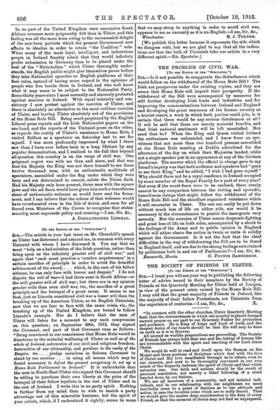[To THE EDITOR 07 THE " SPECTATOR."1 Sin, — The article in
your last issue on Mr. Churchill's speech on Ulster has distressed and amazed me, in common with every Unionist with whom I have discussed it. You say that we must "help on a bad solution of the Irish question, rather than bring upon us the infinitely greater evil of civil war," and again that "each must practise a 'sombre acquiescence,' in a certain sacrifice of principle in order to avoid the dreadful arbitrament of the sword, . . . which, in the case of his fellow citizens, he can only face with horror and despair." I do not dispute the evil of war—I had three sons in South Africa—or the still greater evil of civil war ; but there are in my opinion greater evils than even civil war, viz., the sacrifice of a great principle and the betrayal of a great cause. It seems to me that, just as Lincoln considered civil war a lesser evil than the breaking up of the American Union, so we English Unionists, now that we are face to face with the same crisis, viz., the breaking up of the United Kingdom, are bound to follow Lincoln's example. Nor do I believe that the men of Ulster will listen for a moment to any such compromise on this question; on September 28th, 1912, they signed the Covenant, and part of that Covenant runs as follows : "Being convinced in our consciences that Home Rule would be disastrous to the material wellbeing of Ulster as well as of the whole of Ireland, subversive of our civil and religious freedom, destructive of our citizenship, and perilous to the unity of the Empire, we . . . pledge ourselves in Solemn Covenant to stand by one another . . . in using all means which may be found necessary to defeat the present conspiracy to set up a Home Rule Parliament in Ireland." It is unthinkable that the men in North-East Ulster who signed this Covenant should be willing to purchase their own liberty at the price of the betrayal of their fellow loyalists in the rest of Ulster and in the rest of Ireland. I write this in no party spirit. Nothing is further from my mind than to wish to snatch a party advantage out of this miserable business, but the spirit of your article, which, if I understand it rightly, seems to mean
that we may stoop to anything in order to avoid civil war, appears to me as unmanly as it is un-English.—I am, Sir, &c., [We publish this letter because it represents the side which we disagree with, but we are glad to say that all the indica- tions are that the bulk of Unionists take our article in a very different spirit.—En. Spectator.]














































 Previous page
Previous page